adrenal support
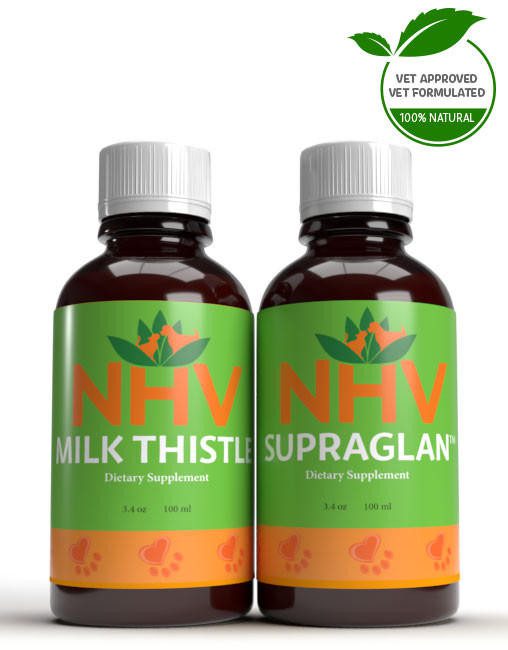
free shipping over $100 (USA & Canada)
1-877-937-4372 the pet expert hotline
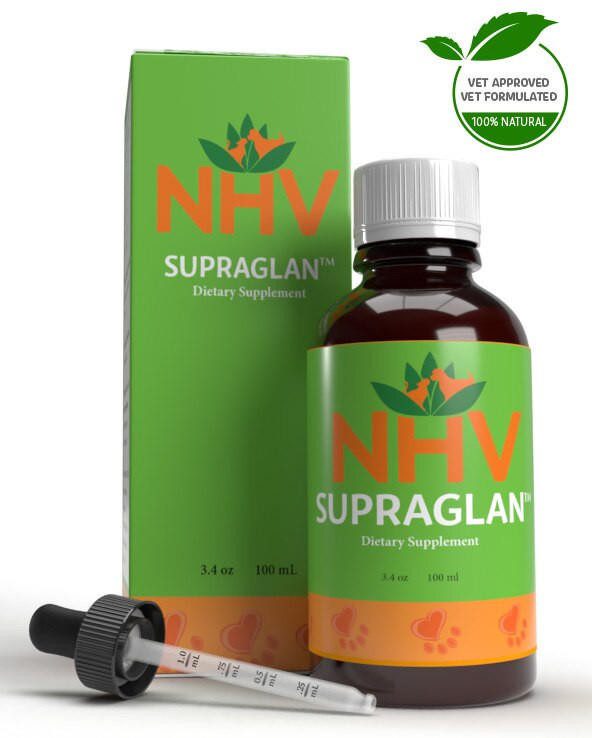
Natural Cushing’s Disease, Adrenal, and Addison’s Support for dogs


Your little one’s adrenal gland regulates many essential functions in your pet’s body. This little structure that sits on top of the kidneys produces some of the most crucial steroid hormones, such as aldosterone and cortisol. This means that any issues with the adrenal gland in dogs can affect their body’s metabolism, immune system, blood pressure, and stress response.
Cortisol is stored in the adrenal glands and is released in times of stress, helping our little one’s body prepare for a fight or flight situation. This release triggers the metabolism to expect physical exertion by mobilizing fat and sugar stores and retaining sodium and water. Lastly, your furkiddo’s whole body prepares to use stored energy more quickly.
However, constant exposure to this hormone on an ongoing basis can cause long-term issues in your little one. In the same way, deficiency in the production of these steroid hormones can be just as dangerous for pets.
Adrenal conditions are more common in adult and senior-aged dogs as opposed to cats. This is why we recommend continually monitoring the adrenal gland in dogs with your local veterinarian.
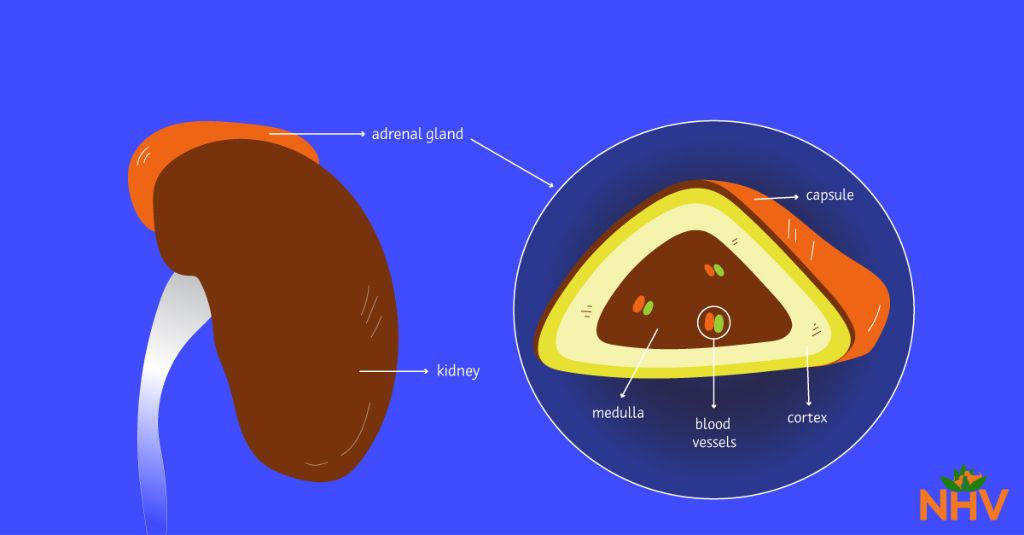
Both Addison’s and Cushing’s diseases result from a malfunction in your little one’s adrenal gland. The difference is that the overproduction of steroid hormones causes Cushing’s disease. On the other hand, Addison’s disease happens when the body is not producing enough steroid hormones necessary for normal function.
85 percent of cases of Cushing’s disease occur in response to a tumor in the pituitary gland.
Lack of energy and increased thirst are symptoms that both conditions show. Cushing’s, however, causes increased appetite, “potbelly,” obesity, thin skin, hair loss, and bruising. Whereas Addison’s is on the other end of the spectrum, causing weight loss, vomiting, diarrhea, and bloody stools.

Illnesses that impact so much of your furkiddo’s overall functionality, like issues with the adrenal gland in dogs, can really benefit from holistic support. That’s because a holistic veterinarian like myself sees your pup’s body as a connected organism and aims at helping each affected part of the whole system.
Our main recommendation for any adrenal issues is NHV Supraglan. We formulated this supplement to help balance the production of adrenal hormones and support pituitary gland function. But, seeing your furkiddo’s body as a whole, this vet-formulated blend also contains herbs that may help support organs and systems that are subjected to additional stress because of the disease.
For example, Astragalus may help buffer adrenal responses to stress, increase energy, improve immunity, regulate blood sugar levels, and alleviate insulin resistance. Kelp is beneficial for maintaining iodine and other trace mineral levels essential for adrenal function.
There are also studies showing that Milk Thistle can signalize the ACTH to send information to the adrenal gland to stop the secretion of cortisol in pets. Therefore, adding our pet-specific NHV Milk Thistle extract can give added benefits to dogs with Cushing’s Disease. You can find both Supraglan and Milk Thistle in our NHV Cushing’s Disease Essentials Kit here.
If you still have questions about adrenal issues in dogs and natural holistic support for diseases like Addison’s and Cushing’s, please know that we are always a message away.
adrenal support

Supraglan & Milk Thistle
bundle and save with pet expert kits
3 month supply for a small to medium size pet.
What is it?
For any of your furry friends suffering from an adrenal gland disorder, our Adrenal Support Essentials Gold kit is the bare bones kit that is formulated to provide multiple organ support and alleviate symptoms.
How Does it Work?
Why Should I Trust It?
Vet-formulated supplements crafted with 100% natural ingredients.

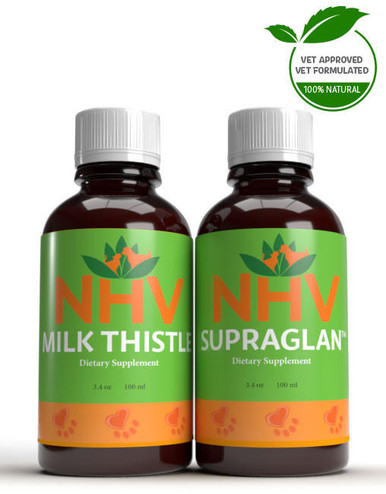
What is it?
For any of your furry friends suffering from an adrenal gland disorder, our Adrenal Support Essentials Gold kit is the bare bones kit that is formulated to provide multiple organ support and alleviate symptoms.
How Does it Work?
Why Should I Trust It?
Vet-formulated supplements crafted with 100% natural ingredients.

In cats and dogs, adrenal gland problems may be tricky to detect early on and, if left untreated, may develop into more severe health problems later on. The adrenal glands may be small, but they play a crucial role in maintaining the body's hormonal balance. In a healthy body, the pituitary gland (located at the base of the brain) can detect dwindling cortisol levels. As a response, the pituitary gland secretes ACTH, a substance that stimulates the adrenal gland to release more cortisol. When the pituitary gland detects that cortisol levels are normal, it stops sending messages.
You can think of the pituitary gland as a smart device for cortisol levels. ACTH secretion occurs throughout the day and regulates the ebb and flow of cortisol levels. The adrenal glands, the pituitary gland, and hypothalamus glands work together to support proper digestion and immune function, and most importantly, they regulate the body's response to stress. As any pet parent knows, dogs and cats can be drama kings and queens when it comes to any changes to their routine or diet. Stress may also be caused by something psychological, like staying at a kennel. When your dog is stressed, their adrenal glands produce hormones that trigger a fight or flight response. This primitive reaction can be a lifesaver in many dangerous situations. Yet, problems may arise when your dog's adrenal system malfunctions due to releasing too much or too little adrenal hormones.
Typical symptoms of an adrenal gland disorder are depression, vomiting, hair loss, and weight fluctuations. To help support your pet, we would recommend a holistic aid that will help to restore the immune system and gently stimulate the endocrine system to normalize hormone production. Supraglan is a blend of natural ingredients specially formulated to add immune support and help to restore normal hormone levels. Ingredients like astragalus and licorice help improve energy levels and water levels, borage helps to promote hair growth, and wild yam helps to stimulate adrenal gland function and calm excitability. Suplaglan also contains many ingredients with anti-inflammatory and antioxidant properties that support healthy liver and kidney function. Milk Thistle provides additional support to the liver and kidneys and has been used for centuries to protect the liver from harmful toxins and encourage regeneration.
At NHV, we know that your pets are your family so we have made it our mission to provide the best natural supplements possible! With only the best organic and wildcrafted ingredients, our master herbalist and holistic vet have created all of our formulations specifically for pets! So if you have any questions about your furkiddo’s Adrenal health, our NHV Pet Experts are here to help!
Made with the finest, organically grown, or ethically harvested herbs. Made specifically for pets, vet-formulated and vet approved.
Supraglan
Milk Thistle
Select your pet's weight to determine the correct dose.
To be taken twice daily. Determine your pet’s weight and then use the easy chart below to determine the correct dose. This is the minimum dosage.
Pet's Weight Dosage
0 - 15 lb = 0.5 ml
16 - 30 lb = 1.0 ml
31 - 45 lb = 1.5 ml
46 - 60 lb = 2.0 ml
61 - 75 lb = 2.5 ml
Over 75 lb = 3.0 ml
For small animals (rabbits, ferrets), avians and reptiles use 1 drop for every 2 lb of body weight.
How to Administer
Shake well before use. The easiest method is to use the dropper provided and place the drops into your pet’s food or favorite treat. You can also use the dropper and squirt directly into the pet’s mouth. Some pets can be finicky, if this occurs consider hiding the drops in foods most pet’s love such as fish, chicken or yogurt or a favorite treat. If your pet only eats dry food then soak a few kibbles at feeding time.
For Best Results
Herbal dietary supplements are beneficial to the health and well-being of your pet and are safe for long-term use. Every pet responds to natural herbal supplements differently, therefore it is important to be consistent and administer the product daily. Supplements generally take two to four weeks to take effect, however this will vary from one animal to the next.
Product Storage
All NHV Natural Pet Products are pure herbal extracts and contain no artificial additives, preservatives or coloring. Shelf life after opening is 6 months and must be refrigerated after opening.
Cautions and Contraindications
Do not use Supraglan in pregnant or nursing animals. Speak to your vet before using our products. A second visit is recommended if your pet’s condition does not improve, or deteriorates after continued use of the supplements.
All information provided by NHV Natural Pet Products is for educational purposes only.
In cats and dogs, adrenal gland problems may be tricky to detect early on and, if left untreated, may develop into more severe health problems later on. The adrenal glands may be small, but they play a crucial role in maintaining the body's hormonal balance. In a healthy body, the pituitary gland (located at the base of the brain) can detect dwindling cortisol levels. As a response, the pituitary gland secretes ACTH, a substance that stimulates the adrenal gland to release more cortisol. When the pituitary gland detects that cortisol levels are normal, it stops sending messages.
You can think of the pituitary gland as a smart device for cortisol levels. ACTH secretion occurs throughout the day and regulates the ebb and flow of cortisol levels. The adrenal glands, the pituitary gland, and hypothalamus glands work together to support proper digestion and immune function, and most importantly, they regulate the body's response to stress. As any pet parent knows, dogs and cats can be drama kings and queens when it comes to any changes to their routine or diet. Stress may also be caused by something psychological, like staying at a kennel. When your dog is stressed, their adrenal glands produce hormones that trigger a fight or flight response. This primitive reaction can be a lifesaver in many dangerous situations. Yet, problems may arise when your dog's adrenal system malfunctions due to releasing too much or too little adrenal hormones.
Typical symptoms of an adrenal gland disorder are depression, vomiting, hair loss, and weight fluctuations. To help support your pet, we would recommend a holistic aid that will help to restore the immune system and gently stimulate the endocrine system to normalize hormone production. Supraglan is a blend of natural ingredients specially formulated to add immune support and help to restore normal hormone levels. Ingredients like astragalus and licorice help improve energy levels and water levels, borage helps to promote hair growth, and wild yam helps to stimulate adrenal gland function and calm excitability. Suplaglan also contains many ingredients with anti-inflammatory and antioxidant properties that support healthy liver and kidney function. Milk Thistle provides additional support to the liver and kidneys and has been used for centuries to protect the liver from harmful toxins and encourage regeneration.
At NHV, we know that your pets are your family so we have made it our mission to provide the best natural supplements possible! With only the best organic and wildcrafted ingredients, our master herbalist and holistic vet have created all of our formulations specifically for pets! So if you have any questions about your furkiddo’s Adrenal health, our NHV Pet Experts are here to help!
Made with the finest, organically grown, or ethically harvested herbs. Made specifically for pets, vet-formulated and vet approved.
Supraglan
Milk Thistle
Select your pet's weight to determine the correct dose.
To be taken twice daily. Determine your pet’s weight and then use the easy chart below to determine the correct dose. This is the minimum dosage.
Pet's Weight Dosage
0 - 15 lb = 0.5 ml
16 - 30 lb = 1.0 ml
31 - 45 lb = 1.5 ml
46 - 60 lb = 2.0 ml
61 - 75 lb = 2.5 ml
Over 75 lb = 3.0 ml
For small animals (rabbits, ferrets), avians and reptiles use 1 drop for every 2 lb of body weight.
How to Administer
Shake well before use. The easiest method is to use the dropper provided and place the drops into your pet’s food or favorite treat. You can also use the dropper and squirt directly into the pet’s mouth. Some pets can be finicky, if this occurs consider hiding the drops in foods most pet’s love such as fish, chicken or yogurt or a favorite treat. If your pet only eats dry food then soak a few kibbles at feeding time.
For Best Results
Herbal dietary supplements are beneficial to the health and well-being of your pet and are safe for long-term use. Every pet responds to natural herbal supplements differently, therefore it is important to be consistent and administer the product daily. Supplements generally take two to four weeks to take effect, however this will vary from one animal to the next.
Product Storage
All NHV Natural Pet Products are pure herbal extracts and contain no artificial additives, preservatives or coloring. Shelf life after opening is 6 months and must be refrigerated after opening.
Cautions and Contraindications
Do not use Supraglan in pregnant or nursing animals. Speak to your vet before using our products. A second visit is recommended if your pet’s condition does not improve, or deteriorates after continued use of the supplements.
All information provided by NHV Natural Pet Products is for educational purposes only.
liver support
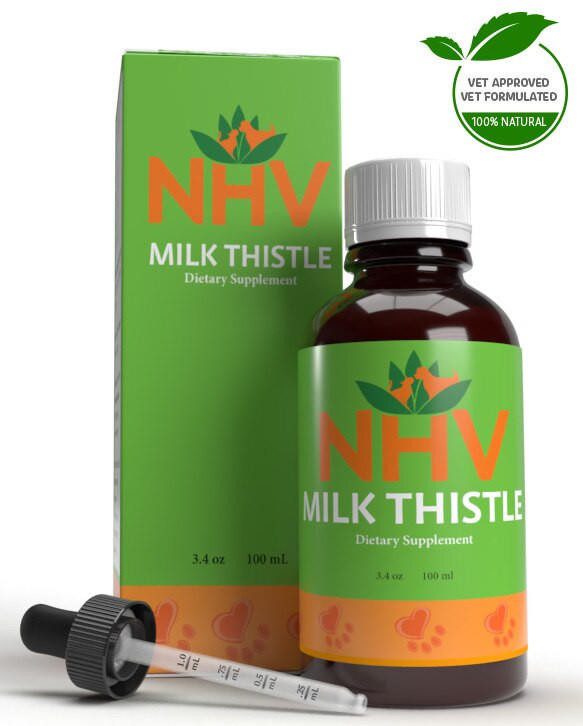
100% Natural Liver and Kidney Detox and Cancer Support in Cats
buy 2 and save $3
3 month supply for a small to medium size pet
What Is It?
Milk Thistle is a well-known herb among conventional and holistic veterinarians, often recommended for cats who have liver disorders, are fighting cancer, diabetes, kidney issues, gallbladder and bile duct issues, as well as hyperthyroidism.
How Does it Work?
Why Should I Trust It?
100% natural supplement approved and formulated by vets.

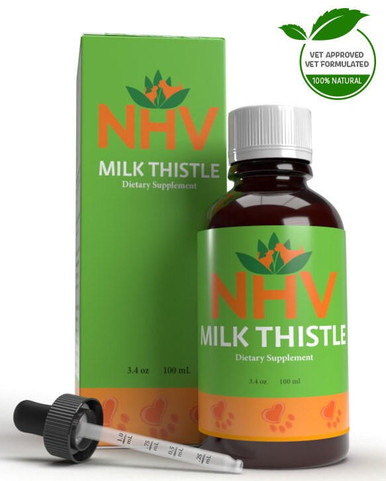
What Is It?
Milk Thistle is a well-known herb among conventional and holistic veterinarians, often recommended for cats who have liver disorders, are fighting cancer, diabetes, kidney issues, gallbladder and bile duct issues, as well as hyperthyroidism.
How Does it Work?
Why Should I Trust It?
100% natural supplement approved and formulated by vets.

Milk thistle, also known as Silybum Marianum is an herb that has been used for thousands of years by humans for its powerful medicinal properties. The active ingredient is Silymarin which contains flavonoids that have many beneficial properties including:
Milk thistle is one of the few herbs that have no equivalent in conventional medicine and has many uses. You can read about the many applications of Milk Thistle for cats and dogs on Dr. Hillary Cook's blog.
Milk Thistle for Liver Function
Milk Thistle for cats with liver disease is glycerin-based and safe for long-term use. This potent herbal formula provides excellent proactive support and can be taken in conjunction with conventional treatment.
Milk Thistle for Kidney Function
Milk Thistle for Anti-Cancer Support
Milk Thistle may also be beneficial to cats undergoing chemotherapy as Silymarium may enhance the activity of certain chemo drugs.
You can read Peachez's Story with Milk Thistle for cats and how it helped her with cancer and liver problems.
NHV’s certified organic Milk Thistle is a safe herb that is recommended and used by holistic practitioners. All of our products are all-natural and formulated by veterinarians with a focus on comprehensively supporting the health and well-being of your feline family member.
If you have questions about Milk Thistle or any of our plant-based products, ask an NHV expert because at NHV we want your kitty’s health to be purrfect!
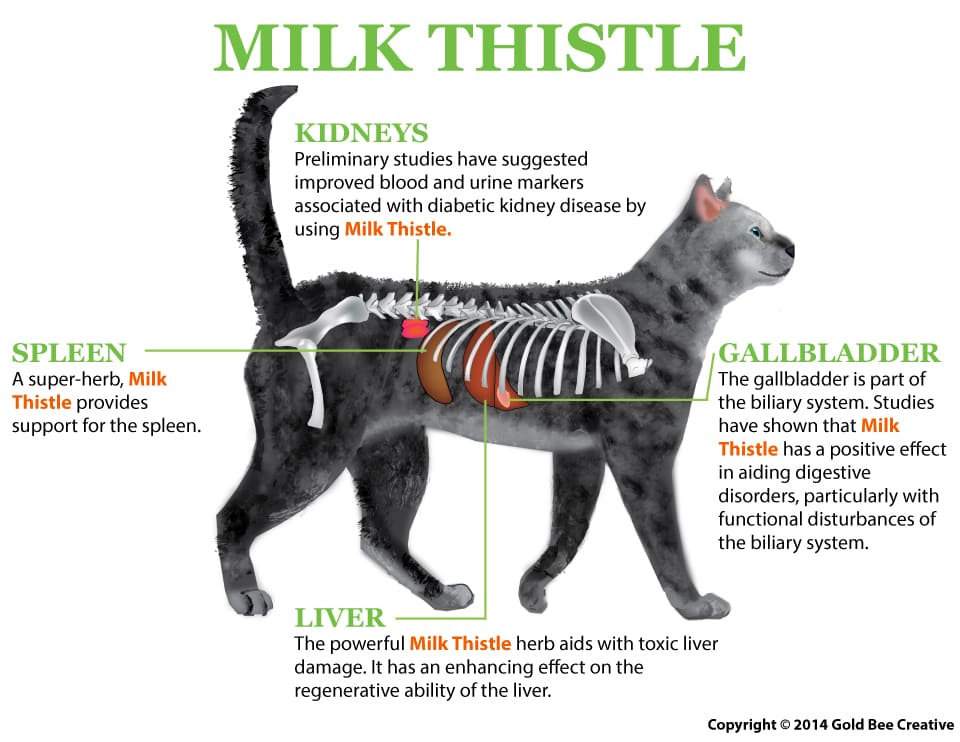
NHV’s Milk Thistle for Cats contains just one ingredient.
Select your pet's weight to determine the correct dose.
To be taken twice daily. Determine your pet’s weight and then use the easy chart below to determine the correct dose. This is the minimum dosage.
Pet's Weight Dosage
0 - 15 lb = 0.5 ml
16 - 30 lb = 1.0 ml
31 - 45 lb = 1.5 ml
46 - 60 lb = 2.0 ml
61 - 75 lb = 2.5 ml
Over 75 lb = 3.0 ml
How to Administer
Shake well before use. The easiest method is to use the dropper provide and places the drops into your pet’s food or favorite treat. You can also use the dropper and squirt directly into the pet’s mouth.
Some pets can be finicky, if this occurs consider hiding the drops in foods most pet’s love such as fish, chicken or yogurt or a favorite treat. If your pet only eats dry food then soak a few kibbles at feeding time.
For Best Results
Herbal dietary supplements are beneficial to the health and wellbeing of your pet and are safe for long-term use. Every pet responds to natural herbal supplements differently, therefore it is important to be consistent and administer the product daily. Supplements generally take two to four weeks to take effect, however this will vary from one animal to the next.
Product Storage
All NHV Natural Pet Products are pure herbal extracts and contain no artificial additives, preservatives or coloring. Shelf life after opening is 6 months and must be refrigerated after opening.
Cautions and Contraindications
Do not use Milk Thistle in pregnant or nursing animals. Speak to your vet before using our products. A second visit is recommended if your pet’s condition does not improve, or deteriorates after continued use of the supplements.
All information provided by NHV Natural Pet Products is for educational purposes only.
Milk thistle, also known as Silybum Marianum is an herb that has been used for thousands of years by humans for its powerful medicinal properties. The active ingredient is Silymarin which contains flavonoids that have many beneficial properties including:
Milk thistle is one of the few herbs that have no equivalent in conventional medicine and has many uses. You can read about the many applications of Milk Thistle for cats and dogs on Dr. Hillary Cook's blog.
Milk Thistle for Liver Function
Milk Thistle for cats with liver disease is glycerin-based and safe for long-term use. This potent herbal formula provides excellent proactive support and can be taken in conjunction with conventional treatment.
Milk Thistle for Kidney Function
Milk Thistle for Anti-Cancer Support
Milk Thistle may also be beneficial to cats undergoing chemotherapy as Silymarium may enhance the activity of certain chemo drugs.
You can read Peachez's Story with Milk Thistle for cats and how it helped her with cancer and liver problems.
NHV’s certified organic Milk Thistle is a safe herb that is recommended and used by holistic practitioners. All of our products are all-natural and formulated by veterinarians with a focus on comprehensively supporting the health and well-being of your feline family member.
If you have questions about Milk Thistle or any of our plant-based products, ask an NHV expert because at NHV we want your kitty’s health to be purrfect!

NHV’s Milk Thistle for Cats contains just one ingredient.
Select your pet's weight to determine the correct dose.
To be taken twice daily. Determine your pet’s weight and then use the easy chart below to determine the correct dose. This is the minimum dosage.
Pet's Weight Dosage
0 - 15 lb = 0.5 ml
16 - 30 lb = 1.0 ml
31 - 45 lb = 1.5 ml
46 - 60 lb = 2.0 ml
61 - 75 lb = 2.5 ml
Over 75 lb = 3.0 ml
How to Administer
Shake well before use. The easiest method is to use the dropper provide and places the drops into your pet’s food or favorite treat. You can also use the dropper and squirt directly into the pet’s mouth.
Some pets can be finicky, if this occurs consider hiding the drops in foods most pet’s love such as fish, chicken or yogurt or a favorite treat. If your pet only eats dry food then soak a few kibbles at feeding time.
For Best Results
Herbal dietary supplements are beneficial to the health and wellbeing of your pet and are safe for long-term use. Every pet responds to natural herbal supplements differently, therefore it is important to be consistent and administer the product daily. Supplements generally take two to four weeks to take effect, however this will vary from one animal to the next.
Product Storage
All NHV Natural Pet Products are pure herbal extracts and contain no artificial additives, preservatives or coloring. Shelf life after opening is 6 months and must be refrigerated after opening.
Cautions and Contraindications
Do not use Milk Thistle in pregnant or nursing animals. Speak to your vet before using our products. A second visit is recommended if your pet’s condition does not improve, or deteriorates after continued use of the supplements.
All information provided by NHV Natural Pet Products is for educational purposes only.
cushing's support
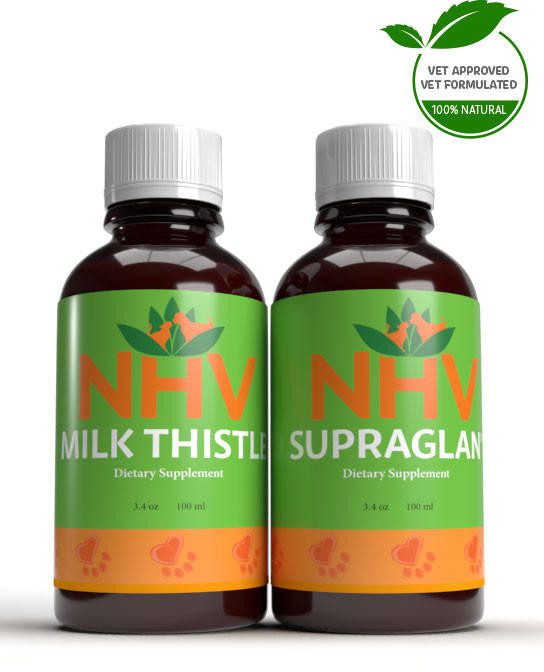
Supraglan & Milk Thistle to Support Dog & Pet Cushing's Disease
bundle and save with pet expert kits
3 month supply for a small to medium size pet.
What is it?
This kit of NHV Supraglan and NHV Milk Thistle may support healthy adrenal gland function, liver enzyme levels, and help your pet to fight infections.
How Does it Work?
Why Should I Trust It?
Natural vet-formulated herbal supplements.

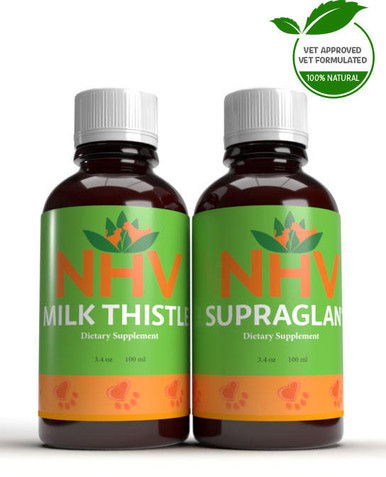
What is it?
This kit of NHV Supraglan and NHV Milk Thistle may support healthy adrenal gland function, liver enzyme levels, and help your pet to fight infections.
How Does it Work?
Why Should I Trust It?
Natural vet-formulated herbal supplements.

If your cat or dog has Cushing’s disease, the NHV Cushing’s Disease Essentials Kit may be beneficial in supporting your pet's overall health and well-being. The combination of NHV Supraglan and NHV Milk Thistle are vet approved and formulated to work synergistically in supporting their pituitary and adrenal gland, liver, and kidney function.
This kit can be taken alone, or together with the conventional Cushing’s treatment for cats and dogs that your veterinarian prescribes. These all-natural supplements are safe to take long-term.
Dog and cat Cushing’s disease is caused by the overproduction of the hormone cortisol by the adrenal gland. Animals with this disease have a suppressed immune system caused by the excessive production of cortisol in the body and are likely to get bladder infections due to this.
Supraglan is a natural herbal supplement that will help to balance the adrenal gland, improving the immune system and help the body fight infections. It may also aid in reducing thirst, excessive urination, appetite, help overall skin condition, and support the kidneys.
Milk Thistle helps support the liver and kidney function. Test results for animals that have Cushing’s indicated elevated liver enzyme levels and enlargement of the liver. Combing these products will help your pet live a healthy life. Visit our blog to read about other’s success in combating dog and pet Cushing’s disease with this essentials kit. Contact our pet experts if you have questions about options for Cushing’s treatment in cats & dogs.
Borage – Gently strengthens and improves adrenal function, and has been used for urinary issues and kidney inflammation.
Astragalus – Helps support the endocrine system, strengthens the immune system and acts as an anti-inflammatory. It has been found useful in helping the body recover from the effects of steroids, which affects the adrenal gland. Has both antibacterial and antiviral properties that aid your veterinarian’s recommended treatment for Cushing’s in cats & dogs.
Bistorte – A soothing anti-inflammatory that has a tonic effect on the liver and kidneys. In herbal medicine, it has been used to aid in urinary tract infections.
Eleuthero – A root that supports adrenal gland function, helps boost a sluggish metabolism, helps improve energy, and studies have shown that it improves the immune system.
Wild Yam – An herb that acts as a liver tonic, and helps normalize hormone production and kidney support. It helps with restlessness and nervousness.
Licorice – An herb that prevents the breakdown of the adrenal hormones. Improves digestion, helps boost immunity levels, and supports liver function.
Dandelion – A highly nutritious food that stimulates liver secretions, kidney function and improves digestion. High in natural vitamins and minerals.
Milk Thistle – In herbal medicine, this herb has been used for centuries to support, regenerate and remove toxins from the liver. Milk Thistle contains silymarin - a compound that protects the liver and stimulates, the production of new cells. It has powerful antioxidant properties, which helps strengthen the liver's resistance to toxic compounds. A healthy liver can be key to the treatment of Cushing’s disease in dogs and pets.
In pets, Milk Thistle is beneficial for damaged kidneys, as it has been shown to decrease the amount of time to heal while helping eliminate toxins.
Select your pet's weight to determine the correct dose.
To be taken twice daily. Determine your pet’s weight and then use the easy chart below to determine the correct dose. This is the minimum dosage.
Pet's Weight Dosage
0 - 15 lb = 0.5 ml
16 - 30 lb = 1.0 ml
31 - 45 lb = 1.5 ml
46 - 60 lb = 2.0 ml
61 - 75 lb = 2.5 ml
Over 75 lb = 3.0 ml
How to Administer
Refrigerate after opening.
Shake well. The easiest method is to use the dropper provided and place Supraglan and Milk Thistle drops into your dogs food or favorite treat. You can also use the dropper and squirt directly into the dogs mouth.
For Best Results
Herbal dietary supplements are beneficial to the health and well-being of your canine and are safe for long-term use. Every pet dog responds to natural herbal supplements differently, therefore it is important to be consistent and administer the product daily. Supplements generally take two to four weeks to take effect, however this will vary from one animal to the next.
Product Storage
All NHV Natural Pet Products are pure herbal extracts and contain no artificial additives, preservatives or coloring. Shelf life after opening is 6 months and must be refrigerated after opening.
Cautions and Contraindications
Do not use Supraglan in pregnant or nursing animals.
All information provided by NHV Natural Pet Products is for educational purposes only.
If your cat or dog has Cushing’s disease, the NHV Cushing’s Disease Essentials Kit may be beneficial in supporting your pet's overall health and well-being. The combination of NHV Supraglan and NHV Milk Thistle are vet approved and formulated to work synergistically in supporting their pituitary and adrenal gland, liver, and kidney function.
This kit can be taken alone, or together with the conventional Cushing’s treatment for cats and dogs that your veterinarian prescribes. These all-natural supplements are safe to take long-term.
Dog and cat Cushing’s disease is caused by the overproduction of the hormone cortisol by the adrenal gland. Animals with this disease have a suppressed immune system caused by the excessive production of cortisol in the body and are likely to get bladder infections due to this.
Supraglan is a natural herbal supplement that will help to balance the adrenal gland, improving the immune system and help the body fight infections. It may also aid in reducing thirst, excessive urination, appetite, help overall skin condition, and support the kidneys.
Milk Thistle helps support the liver and kidney function. Test results for animals that have Cushing’s indicated elevated liver enzyme levels and enlargement of the liver. Combing these products will help your pet live a healthy life. Visit our blog to read about other’s success in combating dog and pet Cushing’s disease with this essentials kit. Contact our pet experts if you have questions about options for Cushing’s treatment in cats & dogs.
Borage – Gently strengthens and improves adrenal function, and has been used for urinary issues and kidney inflammation.
Astragalus – Helps support the endocrine system, strengthens the immune system and acts as an anti-inflammatory. It has been found useful in helping the body recover from the effects of steroids, which affects the adrenal gland. Has both antibacterial and antiviral properties that aid your veterinarian’s recommended treatment for Cushing’s in cats & dogs.
Bistorte – A soothing anti-inflammatory that has a tonic effect on the liver and kidneys. In herbal medicine, it has been used to aid in urinary tract infections.
Eleuthero – A root that supports adrenal gland function, helps boost a sluggish metabolism, helps improve energy, and studies have shown that it improves the immune system.
Wild Yam – An herb that acts as a liver tonic, and helps normalize hormone production and kidney support. It helps with restlessness and nervousness.
Licorice – An herb that prevents the breakdown of the adrenal hormones. Improves digestion, helps boost immunity levels, and supports liver function.
Dandelion – A highly nutritious food that stimulates liver secretions, kidney function and improves digestion. High in natural vitamins and minerals.
Milk Thistle – In herbal medicine, this herb has been used for centuries to support, regenerate and remove toxins from the liver. Milk Thistle contains silymarin - a compound that protects the liver and stimulates, the production of new cells. It has powerful antioxidant properties, which helps strengthen the liver's resistance to toxic compounds. A healthy liver can be key to the treatment of Cushing’s disease in dogs and pets.
In pets, Milk Thistle is beneficial for damaged kidneys, as it has been shown to decrease the amount of time to heal while helping eliminate toxins.
Select your pet's weight to determine the correct dose.
To be taken twice daily. Determine your pet’s weight and then use the easy chart below to determine the correct dose. This is the minimum dosage.
Pet's Weight Dosage
0 - 15 lb = 0.5 ml
16 - 30 lb = 1.0 ml
31 - 45 lb = 1.5 ml
46 - 60 lb = 2.0 ml
61 - 75 lb = 2.5 ml
Over 75 lb = 3.0 ml
How to Administer
Refrigerate after opening.
Shake well. The easiest method is to use the dropper provided and place Supraglan and Milk Thistle drops into your dogs food or favorite treat. You can also use the dropper and squirt directly into the dogs mouth.
For Best Results
Herbal dietary supplements are beneficial to the health and well-being of your canine and are safe for long-term use. Every pet dog responds to natural herbal supplements differently, therefore it is important to be consistent and administer the product daily. Supplements generally take two to four weeks to take effect, however this will vary from one animal to the next.
Product Storage
All NHV Natural Pet Products are pure herbal extracts and contain no artificial additives, preservatives or coloring. Shelf life after opening is 6 months and must be refrigerated after opening.
Cautions and Contraindications
Do not use Supraglan in pregnant or nursing animals.
All information provided by NHV Natural Pet Products is for educational purposes only.
Published: January 3, 2023